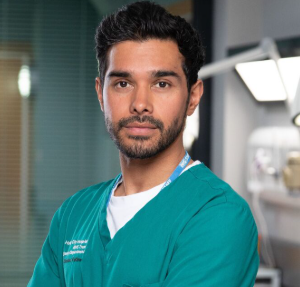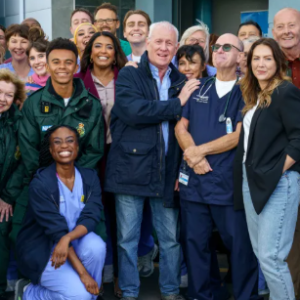The halls of Holby City Hospital have long echoed with the steady, compassionate voice of Charlie Fairhead—a figure as steadfast as the walls themselves. But now, those echoes are growing faint. In a thunderclap of controversy and heartbreak, Casualty, the BBC’s longest-running medical drama, has bid farewell to one of its most iconic characters after nearly forty years—and the storm left behind is far from over.

The man behind the beloved character, Derek Thompson, stepped into Charlie’s shoes in 1986, becoming a fixture not just of the hospital’s emergency department, but of British television itself. For nearly four decades, viewers watched him evolve from a young, hopeful nurse into a grizzled, wise, yet endlessly compassionate mentor. His presence was more than comforting—it was foundational. Charlie wasn’t just a character. He was the soul of Casualty.
But in a turn of events that stunned fans and ignited a firestorm within the show’s own ranks, Charlie’s final chapter did not end in triumph, a quiet retirement, or a celebrated send-off. Instead, his story spiraled into chaos, ending with a bitter sense of finality that many—including his own castmates—feel was unworthy of the legend he became.
It all began with what appeared to be a routine day in the always-chaotic emergency department. The ED was stretched thin, staff under pressure, patients pouring in with no end in sight. Then came the arrival of a mysterious John Doe—broken, bloodied, and clinging to life. Charlie, ever the professional, fought to save him. His hands, worn by years of healing, moved swiftly. But it wasn’t enough. The patient died.

What Charlie didn’t know—what no one knew—was that this man was not just another nameless victim. He was a notorious criminal, one with powerful enemies and a long list of unfinished business. And his death, though unintentional, set off a brutal chain reaction.
In an instant, Charlie was marked. Threats emerged from the shadows. The ED became a battleground—not of medicine, but of fear and vengeance. The very hospital he had dedicated his life to became a place of danger. As anonymous warnings turned into violent encounters, Charlie found himself struggling not only to protect his colleagues, but also the people he loved outside those sterile halls.
The emotional toll was devastating. Long-time colleagues—those who had leaned on Charlie through births, deaths, and near-breakdowns—watched helplessly as their rock began to crack. His eyes no longer held just wisdom. They held fear. Exhaustion. Regret.

But the final blow wasn’t a bullet or a knife in the dark. It was the silence.
No fanfare. No triumphant speech. No final montage of memories. After weathering decades of loss, betrayal, tragedy, and hope, Charlie Fairhead simply… left.
The outrage was immediate. Fans flooded social media. Viewers who had grown up with Charlie—who had cried through his losses, celebrated his victories—were stunned at the lack of ceremony. And they weren’t the only ones.
A current Casualty actress, heartbroken and unfiltered, publicly slammed the show’s handling of Charlie’s departure, calling it a “disgrace” and “deeply disrespectful.” Her words were sharp, and they cut through the usual PR niceties: “After forty years, he deserved more than a rushed exit wrapped in violence and fear. Charlie wasn’t just a character—he was the show.”
Indeed, her words echoed what millions were feeling. Charlie had been the moral compass of Holby. He’d mentored generations of doctors and nurses, guided the department through countless storms, and even when others faltered, he held the line. His quiet, unwavering dedication made him Casualty’s beating heart. And now that heart had been ripped out without so much as a curtain call.
The question lingered bitterly in the air: why?

Speculation ran wild. Some whispered of behind-the-scenes tensions, others pointed to changing creative directions at the BBC. But for fans, explanations mattered less than the emotional vacuum left behind.
Charlie’s exit wasn’t just the end of a character arc. It was the death of an era.
And yet… perhaps that’s what makes the sting so sharp. Because Casualty has always been about chaos, about the unpredictability of life. It’s about how even the strongest among us can be undone by something unseen, something unfair. And Charlie, the man who had given his life to holding others together, became a casualty of that very truth.
Still, in hospital corridors where whispers of legacy linger, Charlie’s presence hasn’t vanished entirely.
His absence is felt in every trauma call. Every coffee break that once held his chuckle. Every young nurse who now walks the same floors he did, unknowingly retracing the path he carved.
And in the faces of those who remain—who fight on, broken but still standing—there’s a glimmer of him. A voice that says: “Do your best. Even when it hurts.”
Perhaps the most tragic part of Charlie’s departure is not that he left—but that his goodbye wasn’t heard.
But for those who watched, who remembered, who felt every moment of his journey—the goodbye rings loud, and long, and raw.





